As guests of Head Consul Roberto Dondisch, the first Jewish Consul General from Mexico in Seattle, and his wife Cynthia, a capacity gathering of Hadassah men and women filled the former Harvard Exit Theater. Nostalgic for the old-time parlor and movie theater venue, the renovated Capitol Hill building has been transformed into a modern office setting housing the Mexican Consul General and a staff of thirty.
 |
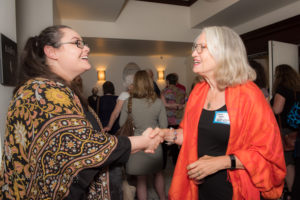 |
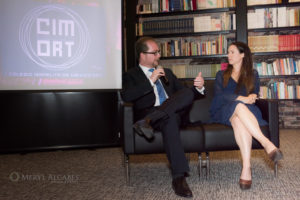 |
Seattle Chapter President Susan Adler introduced the couple with an opening D’Var describing the enduring bond between Mexico and Hadassah. Her remarks highlighted Hadassah Medical Organization’s response to the devastating November 2017 earthquake in Central Mexico – an example of Hadassah’s mission of “building bridges of peace through medicine.” She also told the story of HMO’s Dr. Galili Weisstub, a world expert in adolescent post-traumatic stress disorders syndrome, who worked with the Mexican government to provide crisis intervention training to Ministry of Health officials, Children’s Hospital Staff, educators, and first responders on state-of-the-art strategies for treating trauma and its consequences. Her D’Var concluded by noting that when Hadassah Ein Kerem’s Metta Cohen Pediatric Intensive Care Unit was dedicated in April of 2018 – less than six months after the Mexican earthquake – 80 members of the Hadassah community in Mexico City were in attendance; illustrating the beautiful, bilateral relationship between HMO and the Mexican people.
The evening’s discussion with the Consul General and his wife centered around three topics: the journeys that lead the families of Roberto and Cynthia Dondisch to settle in Mexico, how the couple’s Jewish upbringing and values influence their work, and the diplomatic role of the Consul General in addressing crucial issues including immigration, drug trafficking, and gun violence. In response to these questions, members of the audience had the privilege of learning about this influential couple on both personal and professional levels.
 |
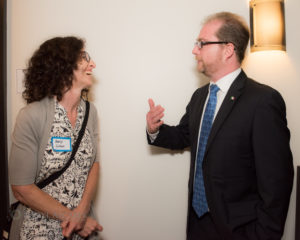 |
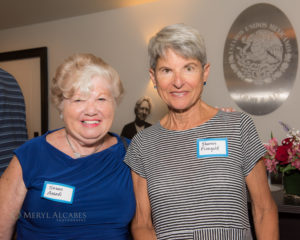 |
Tracing their roots, Roberto and Cynthia discussed their great-grandparents’ flight from Eastern Europe, escaping religious persecution in Russia and Poland during WWI and eventually settling in Mexico. The couple also traced their personal histories and relationship. The pair were high school sweethearts, each of whom earned undergraduate degrees in Mexico before attending graduate school in the United States. Cynthia, an artist, earned an advanced degree in Art History from the George Washington University. She has worked as an art teacher, an art conservationist in the Smithsonian National History Museum, and as the Vice Principal for the largest Jewish Day School in Mexico City. Roberto earned a Master’s Degree in Foreign Service from Georgetown University and a Ph.D. from John Hopkins University in International Relations.
Describing the work of the Consulate in Seattle, which serves the Mexican communities of Washington, Alaska, and portions of Idaho, the Consul General explained that this office assists with everything from the provision of identification and official documents to health care referrals, legal and advocacy services, and documenting births and marriages.
 |
 |
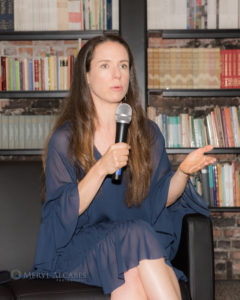 |
In his remarks on diplomacy, the Consul General discussed Mexico’s relationship with the State of Israel, noting that Mexico’s approach is issue-driven rather than alliance driven. When it comes to resolutions introduced in front of the United Nations, for example, he explains that Mexico is independent and conscience-driven, voting on content rather than based on who sponsored or opposes the resolution. He also addressed the strong Mexican economy and the many contributions of Mexican industry to the global economy including the manufacture of airplane parts. Expressing concern, Consul General Dondisch addressed the volume of guns entering Mexico from the U.S., noting that the weapons contribute to the problem of drug trafficking and addiction. In his concluding remarks, he summarized his hopes for diplomacy, ”We want a better future for all; keep the good, get rid of the bad, this is always a challenge.”
 Seattle Hadassah
Seattle Hadassah